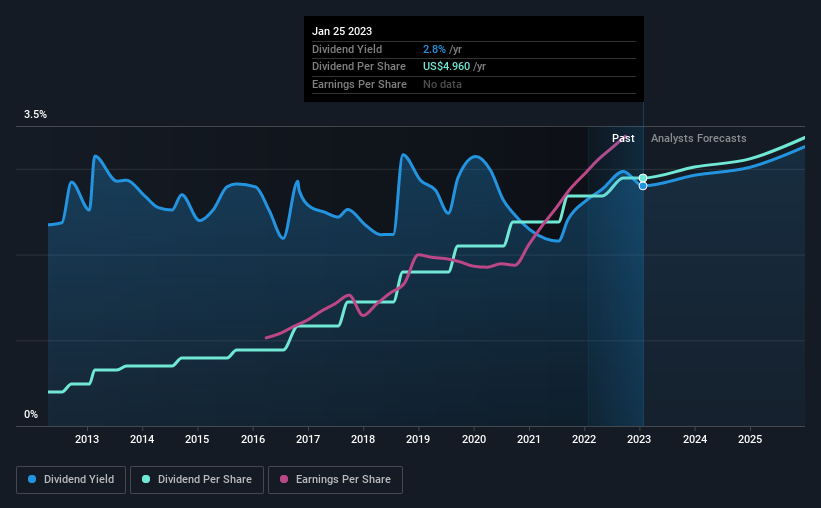Texas Instruments Incorporated (NASDAQ:TXN) Passed Our Checks, And It's About To Pay A US$1.24 Dividend
Some investors rely on dividends for growing their wealth, and if you're one of those dividend sleuths, you might be intrigued to know that Texas Instruments Incorporated (NASDAQ:TXN) is about to go ex-dividend in just four days. Typically, the ex-dividend date is one business day before the record date which is the date on which a company determines the shareholders eligible to receive a dividend. The ex-dividend date is an important date to be aware of as any purchase of the stock made on or after this date might mean a late settlement that doesn't show on the record date. This means that investors who purchase Texas Instruments' shares on or after the 30th of January will not receive the dividend, which will be paid on the 14th of February.
The company's next dividend payment will be US$1.24 per share, on the back of last year when the company paid a total of US$4.96 to shareholders. Based on the last year's worth of payments, Texas Instruments has a trailing yield of 2.8% on the current stock price of $177.04. We love seeing companies pay a dividend, but it's also important to be sure that laying the golden eggs isn't going to kill our golden goose! As a result, readers should always check whether Texas Instruments has been able to grow its dividends, or if the dividend might be cut.
Check out our latest analysis for Texas Instruments
Dividends are typically paid out of company income, so if a company pays out more than it earned, its dividend is usually at a higher risk of being cut. Fortunately Texas Instruments's payout ratio is modest, at just 48% of profit. That said, even highly profitable companies sometimes might not generate enough cash to pay the dividend, which is why we should always check if the dividend is covered by cash flow. Over the last year it paid out 72% of its free cash flow as dividends, within the usual range for most companies.
It's positive to see that Texas Instruments's dividend is covered by both profits and cash flow, since this is generally a sign that the dividend is sustainable, and a lower payout ratio usually suggests a greater margin of safety before the dividend gets cut.
Click here to see the company's payout ratio, plus analyst estimates of its future dividends.
Have Earnings And Dividends Been Growing?
Businesses with strong growth prospects usually make the best dividend payers, because it's easier to grow dividends when earnings per share are improving. If earnings decline and the company is forced to cut its dividend, investors could watch the value of their investment go up in smoke. It's encouraging to see Texas Instruments has grown its earnings rapidly, up 23% a year for the past five years.
The main way most investors will assess a company's dividend prospects is by checking the historical rate of dividend growth. In the last 10 years, Texas Instruments has lifted its dividend by approximately 22% a year on average. It's exciting to see that both earnings and dividends per share have grown rapidly over the past few years.
To Sum It Up
Is Texas Instruments worth buying for its dividend? Earnings per share have grown at a nice rate in recent times and over the last year, Texas Instruments paid out less than half its earnings and a bit over half its free cash flow. There's a lot to like about Texas Instruments, and we would prioritise taking a closer look at it.
So while Texas Instruments looks good from a dividend perspective, it's always worthwhile being up to date with the risks involved in this stock. For example, Texas Instruments has 3 warning signs (and 2 which don't sit too well with us) we think you should know about.
Generally, we wouldn't recommend just buying the first dividend stock you see. Here's a curated list of interesting stocks that are strong dividend payers.
Have feedback on this article? Concerned about the content? Get in touch with us directly. Alternatively, email editorial-team (at) simplywallst.com.
This article by Simply Wall St is general in nature. We provide commentary based on historical data and analyst forecasts only using an unbiased methodology and our articles are not intended to be financial advice. It does not constitute a recommendation to buy or sell any stock, and does not take account of your objectives, or your financial situation. We aim to bring you long-term focused analysis driven by fundamental data. Note that our analysis may not factor in the latest price-sensitive company announcements or qualitative material. Simply Wall St has no position in any stocks mentioned.
Join A Paid User Research Session
You’ll receive a US$30 Amazon Gift card for 1 hour of your time while helping us build better investing tools for the individual investors like yourself. Sign up here

 Yahoo Finance
Yahoo Finance 
